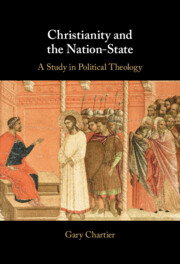3 - Social Order
Published online by Cambridge University Press: 13 July 2023
Summary
Attempted justifications for state authority sometimes appeal to the notion of the common good. We can understand the common good as the genuine and important good of just social order, which enables the pursuit of the varied ways of flourishing embraced by diverse people. Historical examples, theoretical models, and contemporary experiments point to the possibility of institutions that contribute to the maintenance of this good without seeking to rule without consent, to exclude alternatives, or to represent territorially defined populations. “Consociationalism” can be used to name several approaches to rooting decision-making and the fostering of social order in sets of associations. I propose a radical consociationalism in which the associations responsible for protection and adjudication are detached entirely from particular territories. I consider the role of the church in maintaining social order in a radically consociational world. And I explain why I believe radical consociationalism is preferable to global democracy.
- Type
- Chapter
- Information
- Christianity and the Nation-StateA Study in Political Theology, pp. 171 - 221Publisher: Cambridge University PressPrint publication year: 2023

